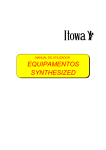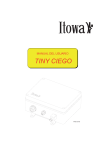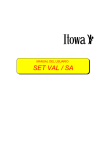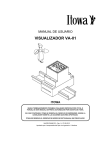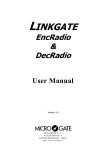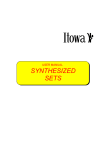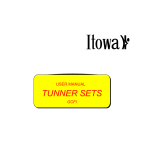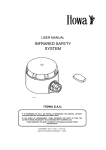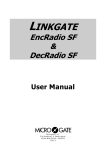Download SYNTHESIZED SETS
Transcript
USER MANUAL SYNTHESIZED SETS MULTI-FREQUENCY SYNTHESIZED SETS BOGGY, COMPACT, COMBI AND BETON Versions: - Conventional - GCFI ITOWA S.A.U. IT IS FORBIDDEN TO FULLY OR PARTIALLY REPRODUCE THIS MANUAL, WITHOUT THE PRIOR WRITTEN AUTHORISATION FROM ITOWA. IN THE EVENT OF INFRINGEMENT, ITOWA RESERVES THE RIGHT TO TAKE THE ACTION IT DEEMS NECESSARY, IN ACCORDANCE WITH CURRENT LAW. ITOWA RESERVES THE RIGHT TO MODIFY THIS MANUAL WITHOUT PRIOR NOTIFICATION MAUNIFIGB REV 5 19-09-05 Approved by Engineering Manager: J. Varela SYNTHESIZED SETS USER MANUAL CONTENTS: 1. INTRODUCTION 1-1 2. GENERAL RULES FOR THE CORRECT AND SAFE USE OF THE RADIO CONTROL 2-1 3. DESCRIPTION OF THE SET 3-1 3.1. TRANSMITTER 3.1.1. COMPACT TRANSMITTERS 3-1 3-2 • TOWER CRANE 3-2 • OVERHEAD CRANE 3-3 3.1.2. BOGGY TRANSMITTERS 3-5 • TOWER CRANE 3-5 • OVERHEAD CRANE 3-6 3.1.3. COMBI TRANSMITTERS 3-8 • TOWER CRANE 3-8 • OVERHEAD CRANE 3-9 3.1.4. BETON TRANSMITTERS FOR CONCRETE PUMPS 3-10 • 3-JOYSTICK TRANSMITTER 3-10 • 2-JOYSTICK TRANSMITTER 3-11 3.2. RECEIVER 3-12 3.2.1. 16-RELAY RECEIVER 3-13 3.2.2. 24 AND 32-RELAY RECEIVER 3-13 3.3. BATTERY CHARGER 4. TECHNICAL SPECIFICATIONS 3-14 4-1 4.1. GENERAL SPECIFICATIONS 4-1 4.2. TRANSMITTER 4-2 4.3. RECEIVER 4-3 4.4. ACCESSORIES 4-4 4.4.1. COMPACT, COMBI, BETON AND BOGGY 4-4 • TRANSFORMER (EXCEPT MODEL BETON) 4-4 • BATTERY CHARGER 4-4 I SYNTHESIZED SETS USER MANUAL 5. INSTALLATION AND START-UP 5.1. INSTALLATION OF THE RECEIVER 5-1 5.2. POWER SUPPLY OF THE RECEIVER 5-1 5.3. START-UP 5-2 6. MAINTENANCE OF RADIO CONTROL SETS 6-1 6.1. MAINTENANCE OF THE TRANSMITTER 6-1 6.2. RECEIVER MAINTENANCE 6-1 6.3. MAINTENANCE OF THE CHARGER 6-2 6.4. CHARGING THE BATTERIES 6-2 7. CHANGING THE WORKING FREQUENCY (NOT VALID FOR GCFI VERSIONS) 7-1 7.1. OPERATION MODE 7-1 7.2. PROCEDURE TO AUTOMATICALLY CHANGE FREQUENCY 7-3 7.3. PROCEDURE TO MANUALLY CHANGE FREQUENCY 7-4 7.4. CHECKING THE SELECTED CHANNEL 7-5 7.5. ANOMALIES WHEN CHANGING THE FREQUENCY 7-6 8. TROUBLESHOOTING 8-1 9. QUICK GUIDE 9-1 9.1. SUMMARY OF FREQUENCY CHANGING (NOT VALID FOR GCFI VERSIONS) 9-1 9.2. POSSIBLE INCIDENTS AND SOLUTIONS 9-2 APPENDIXES A-1 A. DISPLAY MESSAGES A-1 B. CHANNEL-FREQUENCY ASSIGNATION TABLES B-1 B.1. CHANNELS IN THE 433 MHZ FREQUENCY BAND (UN 32 C.N.A.F.) B-1 B.2. CHANNELS IN THE 868 MHZ FREQUENCY BAND (UN 39 C.N.A.F.) B-2 C. USEFUL ADDRESSES II 5-1 C-1 SYNTHESIZED SETS USER MANUAL 1. INTRODUCTION This manual is a guide to the correct use of the range of ITOWA multi-frequency remote control sets. These sets have been specially designed for the wireless remote control of all types of electromechanical machinery. FM frequency and FFSK codification are used for the radio transmission of control signals. The most advanced technology and the latest generation microprocessors have been incorporated in the electronic design. This means total safety when using the radio control. To avoid unwanted manoeuvres, the system is provided with several safety mechanisms that are described further on. Manoeuvres are immediately blocked if any anomalies are automatically detected, The system operates in the UHF frequency band, between the 433.050 and 434.775 MHz frequencies (UN 32 of the C.N.A.F.), or between the 868.000 and 870.000 MHz (UN 39 of the C.N.A.F.) as stipulated in the telecommunications legislation of the I-ETS 300 220, and is certified at the time this manual was published, in the following countries. COUNTRIES COMBI / BETON BOGGY GERMANY D800517K BELGIUM RTT / TI / X84 CZECH REP. SPAIN CTU 2000 3 R1120 08 98 00 75 FINLAND FRANCE COMPACT 08 99 00 77 08 99 00 76 FI98080090 98 0170 PPL 0 GB 98 0171 PPL 0 98 0169 PPL 0 13397 13988 NETHERLANDS - IRELAND ICELAND CEPT LPD NL - TRA 24/5/124 IS-3025-00 ITALY IS-3024-00 IS-3025-00 DGPGF/4/341244 PORTUGAL ICP-009TC-99 SOUTH AFRICA ICP-011TC-99 SATRA SWEDEN SWITZERLAND ICP-010TC-99 Ue970144 U4 33 - - CE 0341 TYPE CERTIFICATE Please ask ITOWA for other certifications 1-1 SYNTHESIZED SETS USER MANUAL GCFI VERSION The GCFI (Intelligent Changing Frequency Management) version is provided with a smart system that allows the equipment to randomly self-change to a free frequency, avoiding interference that usually could stop the equipment when it is working. IMPORTANT: EVERYTHING IN THIS MANUAL RELATED WITH THE FREQUENCY CHANGING IS NOT VALID FOR THIS TYPE OF EQUIPMENT 1-2 SYNTHESIZED SETS USER MANUAL 2. GENERAL RULES FOR THE CORRECT AND SAFE USE OF THE RADIO CONTROL For maximum safety when handling the radio control, the user must follow the rules described in this manual. Whenever the crane has to be manoeuvred, the radio control operator must be in a place where he can view the whole manoeuvre being performed. If this is not possible, he should place himself where he can see as much of the manoeuvre as he can, and coordinate with another person when he cannot see. Never perform a manoeuvre which may be partially uncontrolled. Do not leave the radio control transmitter on the ground or on metal blocks. If you must do so, activate the emergency stop (STOP BUTTON) of the radio control and turn the key or selector switch to the OFF position. At the end of the working day, or if the radio control operator has to leave the radio control, he should activate the emergency stop (STOP BUTTON) of the radio control, turn the key or selector switch to the OFF position, place the battery in the charger for recharging and turn off the crane. 2-1 SYNTHESIZED SETS USER MANUAL 3. DESCRIPTION OF THE SET The remote controls of the SYNTHESIZED range are made up of the following elements: • TRANSMITTER • RECEIVER • BATTERIES • CHARGER 3.1. TRANSMITTER It is a sealed push button box (IP 65 protection) in highly resistant plastic material. The manoeuvre pushbuttons and display leds are in the front part. A housing for interchangeable batteries is provided at the back. As indicated the block diagram (Fig. 3.1), the transmitter consists of three parts: push buttons, control circuit and UHF transmitter. PUSH BUTTONS SWITCHES MODULATOR TRANSMITTER CONTROLS Fig. 3.1 Block diagram of the transmitter. Orders from the push buttons are picked up by the microprocessor, which draws up the FFSK signal adding direction and control codes, and injects it to the UHF transmitter. The transmitter incorporates the signal of this order to the carrier frequency, which after filtering, will be transmitted by the antenna. 3-1 SYNTHESIZED SETS USER MANUAL 3.1.1. COMPACT TRANSMITTERS • TOWER CRANE Fig. 3.2 COMPACT 8/16, TOWER CRANE Fig. 3.3 COMPACT 12/16, TOWER CRANE 3-2 SYNTHESIZED SETS USER MANUAL Fig. 3.4 COMPACT 12/24, TOWER CRANE • OVERHEAD CRANE Fig. 3.5 COMPACT 8/16, OVERHEAD CRANE 3-3 SYNTHESIZED SETS USER MANUAL Fig. 3.6 COMPACT 12/16, OVERHEAD CRANE Fig. 3.7 COMPACT 12/24, OVERHEAD CRANE 3-4 SYNTHESIZED SETS USER MANUAL 3.1.2. BOGGY TRANSMITTERS • TOWER CRANE BOGGY 8/162 TOWER CRANE MOVEMENT RELAY STOP 15 - 16 START- HORN 14 - 13 - 12* RAISE 1-9 LOWER 2-9 RIGHT 3 LEFT 4 TROLLEY BACKWARDS 5 TROLLEY FORWARDS 6 TX BAT Va000874 *FAST SPEED HOISTING. THIS RELAY WILL ONLY BE ACTIVATED WHEN EQUIPMENT IS ON AND WHEN WHATEVER PUSHBUTTON FOR HOISTING IS ACTIVATED. Fig. 3.8 BOGGY 8/162, TOWER CRANE BOGGY 12/16 TOWER CRANE MOVEMENT RELAY STOP 15 - 16 START - HORN 14 - 13 LOWER 1 RAISE 2 CRANE NORTH 3 CRANE SOUTH 4 RIGHT 5 LEFT 6 TROLLEY BACKWARDS 7 TROLLEY FORWARDS 8 AUXILIAR 1 9 AUXILIAR 2 10 TX BAT Va000767 Fig. 3.9 BOGGY 12/16 TOWER CRANE 3-5 SYNTHESIZED SETS USER MANUAL BOGGY 12/164 TOWER CRANE MOVEMENT RELAY STOP 15 - 16 TX BAT START - HORN 14 - 13 LOWER 1 - 11 RAISE 2 - 11 CRANE NORTH 3 CRANE SOUTH 4 RIGHT 5 - 12 LEFT 6 - 12 TROLLEY BACKWARDS 7 TROLLEY FORWARDS 8 AUXILIAR 1 9 AUXILIAR 2 10 Va000875 • OVERHEAD CRANE Fig. 3.10 BOGGY 12/164, TOWER CRANE BOGGY 8/16 OVERHEAD CRANE MOVEMENT RELAY STOP 15 - 16 START - HORN 14 - 13 - 12* RAISE 1 LOWER 2 TROLLEY RIGHT 3 TROLLEY LEFT 4 CRANE NORTH 5 CRANE SOUTH 6 TX BAT *FAST SPEED HOISTING. THIS RELAY WILL ONLY BE ACTIVATED WHEN EQUIPMENT IS ON AND WHEN WHATEVER PUSHBUTTON FOR HOISTING IS ACTIVATED. Va000769 Fig. 3.11 BOGGY 8/16, OVERHEAD CRANE 3-6 SYNTHESIZED SETS USER MANUAL BOGGY 8/166 OVERHEAD CRANE MOVEMENT RELAY STOP 15 - 16 START - HORN 14 - 13 - 12* RAISE 1-9 LOWER 2-9 TROLLEY RIGHT 3 - 10 TROLLEY LEFT 4 - 10 CRANE NORTH 5 - 11 CRANE SOUTH 6 - 11 TX BAT *FAST SPEED HOISTING. THIS RELAY WILL ONLY BE ACTIVATED WHEN EQUIPMENT IS ON AND WHEN WHATEVER PUSHBUTTON FOR HOISTING IS ACTIVATED Va000876 Fig. 3.12 BOGGY 8/166, OVERHEAD CRANE 3-7 SYNTHESIZED SETS USER MANUAL 3.1.3.COMBI TRANSMITTERS • TOWER CRANE 5 4 6 7 9 8 10 11 12 VA000865 3 1 2 Fig. 3.13. COMBI TRANSMITTER FOR TOWER CRANE (The manoeuvres indicated in the table are just a guideline. Manoeuvres can be changed from one supply to another in accordance with customers’ requirements) TOWER CRANE Nº MEANING Nº MEANING Crane North Right 1 Joystick Left Trolley Backwards 2 Joystick Crane South Raise Lower Trolley Forwards 3 Combi-Synthesized Box 4 Slewing brake push button 5 Auxiliary push button 6 Horn push button 7 Start button 8 Emergency stop button 9 On/off travelling button* 10 Low battery led 11 Transmitter led 12 On/off selector switch *As a safety measure, bearing in mind the danger of the manoeuvre, switch no. 9 for tower crane controls, must be in the ON position to enable the Travelling manoeuvre. 3-8 SYNTHESIZED SETS USER MANUAL • OVERHEAD CRANE 4 5 6 7 9 8 10 11 12 VA000866 1 3 2 Fig. 3.14. COMBI TRANSMITTER FOR OVERHEAD CRANE (The manoeuvres indicated in the table are just a guideline. Manoeuvres can be changed from one supply to another in accordance with customers’ requirements) OVERHEAD CRANE Nº MEANING Nº MEANING Lower Trolley Right 1 Joystick Trolley Left Crane Forwards 2 Joystick Raise Crane Backwards 3 Combi-Synthesized Box 4 Auxiliary push button 5 Auxiliary push button 6 Horn push button 7 Start button 8 Emergency stop button 9 Null 10 Low battery led 11 Transmission led 12 On/off selector switch 3-9 SYNTHESIZED SETS USER MANUAL 3.1.3. BETON TRANSMITTERS FOR CONCRETE PUMPS • 3-JOYSTICK TRANSMITTER 5 6 7 8 9 10 11 12 13 VA000868 4 1 2 3 Fig. 3.15. 3-JOYSTICK BETON TRANSMITTER (The manoeuvres indicated in the table are just a guideline. Manoeuvres can be changed from one supply to another in accordance with customers’ requirements) CONCRETE PUMP Nº MEANING Nº 1 Joystick Raise arm 4 Lower arm 4 Raise arm 3 Lower arm 3 2 Joystick 3 Joystick Right Left Raise arm 1 Lower arm 1 4 Beton-Synthesized box 5 Returnable switch reduces r.p.m.) 6 Start push button 7 Pumping/reverse returnable switch 8 Horn returnable switch 9 Auxiliary switch 10 Emergency push button 11 Low battery led 12 Transmission led 13 ON/OFF selector switch 3-10 (increases and MEANING Lower arm 2 Raise arm 2 SYNTHESIZED SETS USER MANUAL • 2-JOYSTICK TRANSMITTER 5 6 7 8 9 10 11 12 13 VA000867 4 3 1 Fig. 3.16. 2-JOYSTICK BETON TRANSMITTER (The manoeuvres indicated in the table are just a guideline. Manoeuvres can be changed from one supply to another in accordance with customers’ requirements) CONCRETE PUMP Nº MEANING Nº MEANING Raise arm 2 Right 1 Joystick Left Lower arm 1 3 Joystick Lower arm 2 Raise arm 3 Lower arm 3 Raise arm 1 4 Beton-Synthesized box 5 Returnable switch (increases and reduces r.p.m.) 6 Start button 7 Pumping/reverse returnable switch 8 Horn returnable switch 9 Auxiliary switch 10 Emergency stop button 11 Low battery led 12 Transmission led 13 ON/OFF selector switch 3-11 SYNTHESIZED SETS USER MANUAL 3.2. RECEIVER The receiver unit consists of a cabinet in which the various electronic systems are located to receive orders and activate / deactivate the corresponding relays for each manoeuvre of the crane. The receiver unit can be divided into three blocks (Fig. 3.17), UHF receiver, control circuit and relay circuit. UHF RECEIVER CONTROL CIRCUIT RELAYS TO MANOEUVRE CONTACTORS Fig. 3.17 Block Diagram of the receiver The signal received by the antenna is injected to the receiver, which supplies a low frequency signal in FFSK code to the micro-processor. The control module checks that the information received is free of errors, and then draws up the corresponding orders to activate the relay. In the event of anomalies in the working order of hardware or software, there are specific circuits in the control circuit, that deactivate the radio control work manoeuvres. For greater safety, all surveillance circuits are doubled. 3-12 SYNTHESIZED SETS USER MANUAL 3.2.1. 16-RELAY RECEIVER Fig. 3.18. 16-relay receiver 3.2.2. 24 AND 32-RELAY RECEIVER VA000734 Fig. 3.19. 24 and 32-relay receiver 3-13 SYNTHESIZED SETS USER MANUAL 3.3. BATTERY CHARGER The ITOWA battery charger can quickly and safely charge Ni-MH and Ni-Cd batteries. The batteries supplied are in Ni-MH, from which the charger extracts their maximum power. The charger is capable of detecting faulty batteries, short circuits or overheating, and can recuperate batteries that have been flat for a long time. The battery charger has two display leds, one for power supply indicating that the unit is connected to the mains, and the other indicating that the batteries are being charged. When the battery is inserted, the charger starts charging without checking the battery for 20 minutes. After this time, the battery charger checks the battery status and charges accordingly for each battery. The end of the process is indicated when the charge display led turns off. Complete charging lasts less than 8 hours. For safety, the maximum charging time is limited to 12 hours. The charging process should be done at a temperature between –10ºC and 50ºC. If , after the initial 20 minutes, the charge display led continues flashing, it means that charging is not being done correctly, either because the temperature is wrong, or because the battery is too flat. In this case, the charger will perform a slow safety pre-charging process in to order to recondition the battery if possible, during with time the charging led will flash. Once this is over , it will continue with the normal charging process. CHARGER LED POWER SUPPLY LED Va000805 BOGGY battery charger Fig. 3.20. Standard battery charger Va000810 COMPACT, COMBI BETON battery charger. 3-14 and SYNTHESIZED SETS USER MANUAL 4. TECHNICAL SPECIFICATIONS 4.1. GENERAL SPECIFICATIONS MANUFACTURER INVESTIGATION TOTAL WARE S.A.U. TYPE MULTI-FREQUENCY FREQUENCY ISM-BAND NUMBER OF ORDERS 32 POSSIBILITY OF WRONG MANOEUVRE 10-18 HAMMING DISTANCE ≥6 PROGRAMMABLE CODE 16777216 ORDER RESPONSE TIME <50 ms ACTIVE EMERGENCY TIME <50 ms PASSIVE EMERGENCY TIME 1900 ms RADIUS OF ACTION 90 metres 4-1 SYNTHESIZED SETS USER MANUAL 4.2. TRANSMITTER UHF UN 32 of C.N.A.F. (433.050 to 434.775 MHz) Frequency band: UHF UN 39 of C.N.A.F. (868.000 to 870.000 MHz) Channelling: 25 kHz Modulation: FM Transmission power: 10 mW P.R.A Coding: FFSK Stability in frequency: + 2.5 ppm (-30ºC a +70ºC) Attenuation of harmonics: > 70 dB Consumption in transmission: 80 mA Consumption in stand-by: < 800 µA Power supply: Removable battery Ni-MH, 7.2 V; 1.5 A/h Endurance: 11 hours + 30 minutes reserve Temperature range: From -10ºC to +55oC Material: BETON Polyamide 6-6, 15 % fibre glass BOGGY P.E.T. COMBI Polyamide 6-6, 15 % fibre glass COMPACT Polyamide 6-6, 30 % fibre glass Approximate weight BETON 1,8 kg (without batteries) BOGGY 8 1,1 kg BOGGY 12 1,5 kg COMBI 1,5 kg COMPACT 8 0,5 kg COMPACT 12 0,6 kg Weight of battery Measurements: 4-2 200 g BETON 272 x 167 x 142 mm BOGGY 8 400 x 80 x 65 mm BOGGY 12 535 x 92 x 65 mm COMBI 272 x 167 x 142 mm COMPACT 8 265 x 80 x 68 mm COMPACT 12 315 x 80 x 68 mm SYNTHESIZED SETS USER MANUAL 4.3. RECEIVER UHF UN 32 of C.N.A.F. (433.050 to 434.775 MHz) Frequency band: UHF UN 39 of C.N.A.F. (868.000 to 870.000 MHz) Sensitivity: 0.3 µV Image frequency rejection: >65 dB Protection against intermodulation: >65 dB Adjacent channel rejection: >65 dB Relays: Number of switchings: Resistive load: 5 A + 5 A at 250 Vac or 30 Vdc Inductive load (cosØ=0.4): 2 A at 250 Vac or 3 A at 30 Vdc Maximum operation voltage: 380 Vac , 125 Vdc Minimum admissible load: 10 mA at 5 Vdc Resistive load: 106 manoeuvres 2 A at 250 Vac or 30 Vdc Inductive load (cosØ=0.4): 106 manoeuvres 1.2A at 250 Vac or 30 Vdc Power supply: Max. consumption: 48 Vac / 115 Vac / 230 Vac (-20% +15%) according to EN 60047-5-1 16 Relays: 0,7 A / 0,29 A / 0,14 A 32 Relays: 0,9 A/ 0,35 A / 0,18 A Fuses: Dimensions: Transformer primary: 1 A / 230V ; 2 A / 115V ; 4 A / 48V Transformer secondary: 4A Safety output: 8A 16 Relays: Inside: Outside: 32 Relays: Inside: Weight: Protection: 240 x 190 x 90 mm 255 x 200 x 95 mm 300 x 220 x 115 mm Outside: 315 x 235 x 120 mm 16 Relays: 2,8 kg 32 Relays: 4,2 kg IP 65 4-3 SYNTHESIZED SETS USER MANUAL 4.4. ACCESSORIES 4.4.1. COMPACT, COMBI, BETON AND BOGGY BETON sets do not have a transformer and are only supplied at 24 Vdc. • TRANSFORMER (EXCEPT MODEL BETON) Power supply: 230 Vac / 14 Vdc Consumption: 3,6 VA Weight 0,35 kg • BATTERY CHARGER 4-4 Power supply: 14 Vdc / 24 Vdc Consumption: 0,4 A Power: 6W Load intensity: 120 mA Loading time: 8 hours Box: Polyamide 6-6, 15% fibre glass Protection: IP30 Dimensions: 73 x 69 x 72 mm Approximate weight: 0,2 kg SYNTHESIZED SETS USER MANUAL 5. INSTALLATION AND START-UP 5.1. INSTALLATION OF THE RECEIVER The control receiver should be installed in a vertical position, fastened to the structure of the machine, with the antenna directed to the floor, and in a protected place so that when working, it does not get knocked. ATTENTION IT IS IMPORTANT TO PROPERLY CLOSE THE COVER OF THE RECEIVER TO ENSURE SEALING, AS WATER LEAKING INSIDE MAY DAMAGE THE RECEIVER. THE GUARANTEE DOES NOT COVER ANY BREAKDOWNS CAUSED BY INCORRECTLY CLOSING THE COVER. It is recommended to connect the set with a standard multi-cable flexible hose used to connect push button boxes by cable. This hose will be connected to the set at one end, and the other will be connected to a multi-pole connector identical to the one used by the machine to interconnect with a push button box by cable. This enables the remote control or the cable control to be interchanged simply by connecting or disconnecting the flexible hose. ATTENTION: THE HORN RELAY SHOULD NOT BE CONNECTED TO CONTROL ANY OTHER MANOEUVRE UNLESS OTHERWISE INDICATED. The common manoeuvre lead should have a suitable diameter, not over 2.5 mm. nor less than 1.5 mm., nor should two 0.75 cables be placed. The common manoeuvre lead should not, under any circumstances, be less than the diameter of the manoeuvre leads. 5.2. POWER SUPPLY OF THE RECEIVER ATTENTION: CONNECTIONS SHOULD BE MADE SO THAT WHEN THE GENERAL SWITCH IS TURNED OFF, THE REMOTE CONTROL RECEIVER IS ALSO TURNED OFF. The receiver can be connected to three different alternating voltages (230 Vac, 115 Vac, or 48 Vac) , except the BETON receiver that connects to a set voltage of 24 Vdc, through a three-position selector located inside the set. It is essential to ensure that the selector is in the correct position in accordance with the voltage to be supplied to the receiver, before connecting the set. All receivers leave the factory with the voltage pre-set at 230 Vac and 1A, but as a precautionary measure, it is advisable to check that the voltage is correctly selected. .A three-wire 0.75 mm2 section cable should be used to connect to the mains, connecting two cables to voltage and the third to earth (green-yellow). 5-1 SYNTHESIZED SETS USER MANUAL 5.3. START-UP Once the receiver is installed and when the general switch of the machine is turned on, the LCD display of the receiver will light up indicating the current operating channel xx, which could be from 01 to 70 or from 1 to 81 (depending on the frequency band). The receiver is now ready to operate and receive manoeuvres from the transmitter. ITOWA S.A RRC16 OPERATING CH.: xx ITOWA S.A RRC32 OPERATING CH.: xx In GCFI versions it shows: ITOWA S.A RRC16 gcfi ITOWA S.A RRC32 gcfi Insert a charged battery and switch off the emergency stop button (STOP BUTTON). When the START push button is pressed, the remote control will start to operate by turning on the stop and start relays, and the general contactor will be interlocked. The TX ON led will turn on indicating that the remote control is working correctly. From now on, if any push button is pressed, the corresponding manoeuvre will be activated. The manoeuvre selected will continue to be activated while the push button remains pressed. The receiver display indicates the activated relays with a deactivated relays with a 0 . 0 0 0 0 0 0 0 0 I I 0 0 0 0 I I I and the 0000000000000000 I I 0000 I 0000000 I i In order to keep the radio channel free and stop the operator from leaving the machine turned on when it is not being used, the remote control is supplied with an automatic stop system. This system starts operating after 180 seconds from when the last manoeuvre was performed, indicating the following message in the display: 5-2 ITOWA S.A RRC16 OPERATING CH.: xx ITOWA S.A RRC32 OPERATING CH.: xx ITOWA S.A RRC16 gcfi ITOWA S.A RRC32 gcfi SYNTHESIZED SETS USER MANUAL To restart the transmitter, press the START button. To turn off the transmitter, press the STOP BUTTON. The emergency stop is activated by pressing the STOP BUTTON. This will turn off the stop relays and the remote control. In this situation, all relays that were on will be turned off and the initial message will be indicated on the LCD display. ITOWA S.A RRC16 OPERATING CH.: xx ITOWA S.A RRC32 OPERATING CH.: xx ITOWA S.A RRC16 gcfi ITOWA S.A RRC32 gcfi ATTENTION: REMEMBER THAT ACTIVATING THE STOP BUTTON IS THE SAME AS STOPPING THE REMOTE CONTROL. THIS MEANS THAT ANY RELAY OF THE RECEIVER THAT WAS ACTIVATED IS IMMEDIATELY TURNED OFF. The remote control is supplied with an indicator led of the state of the battery. When it detects that the battery is at a certain discharging level (in reserve), the BAT OK led starts to flash and the horn relay turns on intermittently. After approximately half an hour, the transmitter turns off and the battery led stays on permanently. When the battery is in reserve, it is recommended to replace it with the second battery and insert the first one to charge. Under normal conditions, the batteries can work for 11 hours plus 30 minutes reserve time. ATTENTION: IF THE BATTERY IS IN RESERVE, THE FREQUENCY CANNOT BE CHANGED. PLEASE FULLY CHARGE THE BATTERIES BEFORE USING THE EQUIPMENT FOR THE FIRST TIME 5-3 SYNTHESIZED SETS USER MANUAL 6. MAINTENANCE OF RADIO CONTROL SETS The equipment you have purchased is manufactured using top quality materials ensuring perfect working order and operation of the remote control. Similarly to all machinery or equipment, the remote control requires minimum basic maintenance tasks that should be performed. In order to increase the life span of the apparatus, we advise you to carefully follow these preservation and maintenance recommendations. As a general rule, it is advisable to periodically service the sealing devices that protect both the receiver and transmitter from weathering. Servicing should be carried out by an ITOWA authorised Technical Assistance Service, as incorrect sealing may cause irreparable damage to the equipment. 6.1. MAINTENANCE OF THE TRANSMITTER ATTENTION: BEFORE HANDLING THE TRANSMITTER, TURN OFF THE GENERAL SWITCH OF THE MACHINE The remote control requires minimum maintenance. The good condition of the transmitter should be checked paying special attention to joints and rubber protections of the push buttons. The silicone caps of the push buttons should be replaced if they have been cut or damaged as a result of incorrect use of the apparatus. ATTENTION: DAMAGED RUBBER OF PUSH BUTTONS SHOULD BE REPLACED IMMEDIATELY, OTHERWISE WATER MAY DAMAGE THE TRANSMITTER. 6.2. RECEIVER MAINTENANCE Maintenance of the receiver is identical to the transmitter. The following parts must be checked: • The antenna connection (check that it is clean and free of rust). • The connection between the receiver and electrical equipment of the machine. • Contacts of the manoeuvre relays. • The correct working order of the active and passive safety circuits. • The correct working order of the LCD display messages. • The receiver cover should be properly sealed. To check the working order of the active safety circuit, simply press the STOP BUTTON. The general contactor should drop immediately. To check the working order of the passive safety circuit, remove the battery from the transmitter and the general contactor should drop after 1.9 seconds. 6-1 SYNTHESIZED SETS USER MANUAL 6.3. MAINTENANCE OF THE CHARGER Maintenance of the charger is carried out at a similar frequency to the set. The following parts should be checked: • Contacts and battery holders (which should be clean and free of rust). • Springs (ensure that they are sufficiently taut to guarantee contact). ATTENTION: IF YOU DETECT ANY ANOMALY IN THE WORKING ORDER OF THE EQUIPMENT, IT SHOULD BE IMMEDIATELY SWITCHED OFF. REPAIRS SHOULD BE CARRIED OUT BY A TECHNICAL SERVICE AUTHORISED BY ITOWA. ORIGINAL ITOWA SPARE PARTS SHOULD ALWAYS BE USED. IT IS NOT PERMITTED TO ALTER THE SPECIFICATIONS OF THE RADIO FREQUENCY SYSTEM OR THE CIRCUITS INVOLVED IN THE SAFETY SYSTEMS. If you have any doubt or enquiry, contact our Technical Assistance Service or any of our authorised technicians. 6.4. CHARGING THE BATTERIES The batteries supplied with ITOWA equipment do not have a memory effect, meaning that they can be charged without having to the totally flat. In order to lengthen their life span, it is recommended to use one battery in the morning and another in the afternoon. One battery can then be charged while the other is being used. 6-2 SYNTHESIZED SETS USER MANUAL 7. CHANGING THE WORKING FREQUENCY (NOT VALID FOR GCFI VERSIONS) ATTENTION: THE WORKING FREQUENCY SHOULD ONLY BE CARRIED OUT BY AUTHORISED STAFF. 7.1. OPERATION MODE The system can operate in three modes: - Mode 1: change of frequency disabled - Mode 2: change of frequency in manual mode - Mode 3: change of frequency in automatic mode. ATTENTION: THE EQUIPMENT IS DELIVERED WITH THE CHANGE OF FREQUENCY IN AUTOMATIC MODE. Changing the operation mode: 1) Unlock the STOP BUTTON and remove the key or turn off the selector switch (or battery). 2) Press the START and UNITS buttons (in COMPACT AND BOGGY models) or the START button and right joystick in the UNITS position (in COMBI and BETON models) at the same time. Keep them pressed and insert and turn the key or turn on the selector switch (or insert the battery). The TX and low battery leds will flash simultaneously from one to three times, indicating the operation mode that has been programmed, which can be: - Mode 1: change of frequency disabled (one flash). - Mode 2: change of frequency in manual mode (two flashes). - Mode 3: change of frequency in automatic mode (three flashes). Repeat the sequence to go successively from mode 1 (change of frequency disabled) to mode 2 (change of frequency in manual mode), from mode 2 to mode 3 (change of frequency in automatic mode), from mode 3 again to mode 1, etc. 7-1 SYNTHESIZED SETS USER MANUAL Fig. 7.1. Elements to change frequency in COMPACT and BOGGY models. VALIDATE START EMERGENCY STOP ON/OFF KEY TENS START VALIDATE EMERGENCY STOP UNITS VA000877 UNITS ON/OFF KEY VA000878 TENS Fig. 7.2. Elements to change frequency in COMBI and BETON models To change the working frequency, select the manual or automatic frequency change mode. 7-2 SYNTHESIZED SETS USER MANUAL The system operates in the UHF band in frequencies from 433.050 MHz to 434.775 MHz (UN 32 of C.N.A.F.) or from 868.000 to 870.000 MHz (UN 39 of C.N.A.F.), depending on the model you have purchased, and meets the telecommunications and safety regulations I-ETS 300-220. There are 70 or 81 possible working channels in this frequency band (see channel assignation tables on pages. B-1 an B2). 7.2. PROCEDURE TO AUTOMATICALLY CHANGE FREQUENCY ATTENTION: TO AUTOMATICALLY CHANGE FREQUENCY, THE AUTOMATIC CHANGE OF FREQUENCY MODE SHOULD BE SELECTED (MODE 3) To automatically change the working frequency, the following steps should be carried out on the transmitter: (The text diagrams are the messages that appear on the LCD display in the receiver) 1. If you are working with the remote control, as a safety measure, remove the transmitter battery to disconnect the equipment. 2. Insert a charged battery. It is not possible to change frequency with a battery in stand-by. 3. Make sure the receiver is ready for operating. The following message will appear on the LCD display, indicating that there is voltage and the last channel in which you were working: ITOWA S.A RRC16 OPERATING CH.: xx ITOWA S.A RRC32 OPERATING CH.: xx ATTENTION: PLACE THE TRANSMITTER AT THE FOOT OF THE CRANE 4. If the STOP BUTTON is pressed, it should be released. 5. Press the START button. Keep it pressed and press the STOP BUTTON. The equipment selects a new frequency automatically and the selected channel is sent to the receiver, which will display the following messages: CHANGING FREQ. TO CH.: xx_OK ITOWA S.A RRC16 CHANNEL: xx 7-3 SYNTHESIZED SETS USER MANUAL The frequency has been changed correctly. The TX ON y BAT OK indicators will have stopped flashing. The equipment is ready to start operating. If the frequency has not been changed correctly, repeat the process until the receiver picks up a new channel. After changing the working channel, in order to continue operating with the radio control, release the emergency stop button (STOP BUTTON) and press the START press button. In the receiver, the stop and start relays will activate, and the general contactor will therefore be interlocked. At the same time, the TX ON indicator of the transmitter will turn on indicating that the remote control is operating correctly and all manoeuvres can be performed. 7.3. PROCEDURE TO MANUALLY CHANGE FREQUENCY ATTENTION: TO MANUALLY CHANGE FREQUENCY, THE MANUAL CHANGE OF FREQUENCY MODE SHOULD BE SELECTED (MODE 2) To manually change the working frequency, the following steps should be carried out on the transmitter: (The text diagrams are the messages that appear on the LCD display in the receiver) 1. If you are working with the remote control, as a safety measure, remove the transmitter battery to disconnect the equipment. 2. Insert a charged battery. It is not possible to change frequency with a battery in stand-by. 3. Make sure the receiver is ready for operating. The following message will appear on the LCD display, indicating that there is voltage and the last channel in which you were working: ITOWA S.A RRC16 OPERATING CH.: xx ITOWA S.A RRC32 OPERATING CH.: xx ATTENTION: PLACE THE TRANSMITTER AT THE FOOT OF THE CRANE 4. If the Stop Button is pressed, it should be released 5. Press the START button. Keep it pressed and press the STOP BUTTON. The TX ON and BAT OK indicators will flash alternately. The receiver will indicate that the new working channel is on stand-by: WAITING RECEPT. FREQ. CHANGING 7-4 SYNTHESIZED SETS USER MANUAL You now have 60 seconds to enter the new working channel. After this time, the unit will exit the programming mode and will keep the previous channel indicating the following message: OUT OF TIME REMAINING CH.: XX 6. Enter the channel number, 27 for example, by pressing the master control or moving the joystick corresponding to tens twice and seven times corresponding to units, as indicated in figures 7.1 and 7.2 and accept: 7. The selected channel is sent to the receiver, which will indicate the following messages on the display: CHANGING FREQ. TO CH.: 27_OK ITOWA S.A RRC16 OPERATING CH.: 27 The frequency has been changed correctly. The TX ON y BAT OK indicators will have stopped flashing. The equipment is ready to start operating. After changing the working channel, in order to continue operating with the radio control, release the emergency stop button (STOP BUTTON) and press the START press button. In the receiver, the stop and start relays will activate, and the general contactor will therefore be interlocked. At the same time, the TX ON indicator of the transmitter will turn on indicating that the remote control is operating correctly and all manoeuvres can be performed. If you have started changing the frequency in manual mode and the pushbutton is validated without having entered the units or tens, the telecontrol unit will automatically select channel 1. CHANGING FREQ. TO CH.: 01_OK ITOWA S.A RRC16 OPERATING CH.: 01 7.4. CHECKING THE SELECTED CHANNEL After changing the frequency, it is advisable to check that the selected channel is not already occupied. Carry out the following operations: 1. Turn off the transmitter by pressing the STOP BUTTON. 2. If the channel occupied, the following message will appear: BUSY CHANNEL FREE CHANNEL: XX 7-5 SYNTHESIZED SETS USER MANUAL In this case the transmission channel must be changed again. It is recommended to manually change the frequency selecting the channel indicated on the display. 7.5. ANOMALIES WHEN CHANGING THE FREQUENCY This section describes the possible anomalies that could occur when changing the frequency, and how to solve them. SITUATION When programming PROBLEM ACTION the The TX ON and BAT OK The working channel and after indicators do not that the battery is flash charged. turning off the stop button and alternately. turning on the on button. After changing the working The stop and start relays are Keep the transmitter on button channel. not activated. pressed until the relay is activated (maximum 1 minute). Erroneous introduction of the The wrong working channel Repeat the whole process working channel. 7-6 has been entered. with the right working channel. SYNTHESIZED SETS USER MANUAL 8. TROUBLESHOOTING If an anomaly occurs in the equipment, check the following: 1) Location of the breakdown: Determine whether the breakdown is in the remote control equipment or in the electrical circuit of the machine. To check this, simply connect the original pushbuttons to the machine (or from the cabin), and check that the crane is operating properly. If the machine is working correctly, it means that the breakdown is in the remote control, otherwise the breakdown is in the machine. 2) Checking for interferences (not valid for GCFI versions): If the transmitter loses range or if the equipment constantly needs to be reset, there may be an interference in the selected channel. Check that the selected channel is free of interferences by following the procedures described in section 7.4 (page 7-5). 3) Checking the transmitter: Turn on the remote control by releasing the STOP BUTTON and pressing the START button. The “TX OK” led should activate. If this indicator lights up, the problem is in the receive. If this is not the case, check that the battery is charged. If the “BAT OK” led is flashing, it means that the battery is on stand-by and the equipment can still transmit signals but will stop transmitting shortly. If the “BAT OK” is on, it means that the battery is flat and must be replaced by a fully charged battery. If the battery is charged correctly, check that the pushbuttons operate properly. If they do, the transmitter will have to be repaired by the Technical Assistance Service authorised by ITOWA. 4) Checking the receiver: Check the power supply. The receiver display should be on; if it is not, check the power supply circuit connection. If the power supply is correct, press the START button of the transmitter and check whether the stop and start relays are activated. If they are, check the manoeuvre fuse. If the stop and start relays are not activated, check that there is voltage. If there is, the receiver must be repaired by the Technical Assistance Service authorised by ITOWA. Check that the antenna and connection to the receiver are in good condition. ATTENTION: ORIGINAL SPARE PARTS SHOULD BE USED IN ALL REPAIRS. ALL SAFETY FEATURES INCLUDING THOSE OF THE TRANSMITTER AND UHF RECEIVER SHOULD NOT BE MODIFIED. 8-1 SYNTHESIZED SETS USER MANUAL 9. QUICK GUIDE 9.1. SUMMARY OF FREQUENCY CHANGING (NOT VALID FOR GCFI VERSIONS) 1. PRESS THE START BUTTON AND STOP BUTTON SIMULTANEOUSLY 2. PRESS THE UNITS AND TENS BUTTONS AS MANY TIMES AS NECESSARY TO ENTER THE REQUIRED CHANNEL NUMBER 3. PRESS PUSHBUTTON . THE VALIDATION 4. RELEASE THE STOP BUTTON 5. PRESS START BUTTON. MANOEUVRES CAN NOW PERFORMED. ALL BE 9-1 SYNTHESIZED SETS USER MANUAL 9.2. POSSIBLE INCIDENTS AND SOLUTIONS INCIDENT THE CHANNEL CHANGES AND THE MACHINE DOES NOT RESPOND (except for GCFI versions) CAUSE The selected working channel is occupied by another transmitter SOLUTION Select another working channel INCIDENT NO MANOEUVRE CAN BE PERFORMED INDICATION TX ON led is on. CAUSE The START button has not been pressed SOLUTION Press the START button INDICATION It is not possible to change the frequency * CAUSE The battery is on standby or completely flat SOLUTION Change the battery INDICATION Low battery led is permanently on CAUSE Flat battery SOLUTION Replace it with a charged battery Charge the flat battery INCIDENT THE TRANSFER MANOEUVRE DOES NOT WORK CAUSE Transfer switch of the transmitter is in the OFF position SOLUTION Turn the switch ON INCIDENT THE TRANSMITTER HAS LIMITED RANGE CAUSE The antenna is disconnected, broken or in bad condition SOLUTION Replace the antenna, contact the Technical Service Assistance INCIDENT THE TX ON LED IS FLASHING CAUSE A manoeuvre master control or pushbutton is pressed SOLUTION Check their condition _______________________________ * Not valid for GCFI versions. 9-2 SYNTHESIZED SETS USER MANUAL APPENDIXES A. DISPLAY MESSAGES ITOWA S.A RRC16 OPERATING CH.: xx ITOWA S.A RRC32 OPERATING CH.: xx In GCFI versions, it shows: ITOWA S.A RRC16 gcfi ITOWA S.A RRC32 gcfi Initial and reception standby message, appearing after start-up or when on standby for a manoeuvre. It indicates the availability of the receiver to perform any manoeuvre in the working channel:xx. 0 0 0 0 0 0 0 0 I I 0 0 0 0 I I 0000000000000000 I I 0000 I 0000000 I i Message appearing when the operator is working with the equipment. Symbol certain relay has been activated, and the symbol 0 I indicates that a indicates deactivation. The relays are numbered from left to right and from up to down. * Not valid for GCFI versions. changing freq. to CH.: xx ITOWA S.A RRC16 OPERATING CH.: xx Messages appearing before correctly changing a channel. Indication of the new working channel. A-1 SYNTHESIZED SETS USER MANUAL * Not valid for GCFI versions. WAITING RECEPT. FREQ. CHANGING This message appears in the operation to change the working channel, when the receiver is on standby for the operator to enter the new working channel in the transmitter. Once this message appears, you have 60 seconds to enter the new working channel. If it is not entered, the receiver will exit the programming mode and the equipment will remain in the original channel. The following message then appears: * Not valid for GCFI versions. BUSY CHANNEL FREE CHANNEL: XX Message indicating the existence of another device near the same operation frequency as the equipment. In this situation, the receiver offers another possible free channel as a solution. EMERGENCY RELAY FAILURE N.: XX Message appearing on the display if a fault occurs in one of the two guided stop relays. A-2 SYNTHESIZED SETS USER MANUAL SERIAL DRIVERS FAILURE Message appearing on the display if a fault occurs in any of the control drivers of the relays. * Not valid for GCFI versions. WRITING CHANNEL: XX_OK Message appearing on the display when the receiver locates its equipment code and working frequency after scanning all the channels. This situation occurs when the receiver is in the frequency change process but is not receiving the new channel. E2PROM FAILURE Message appearing in the display if there is a fault in the E2PROM memory of the receiver. In this case, contact the authorised technical service. A-3 SYNTHESIZED SETS USER MANUAL B. CHANNEL-FREQUENCY ASSIGNATION TABLES B.1. CHANNELS IN THE 433 MHz FREQUENCY BAND (UN 32 C.N.A.F.) Channel 1: 433.050 MHz Channel 25 : 433.650 MHz Channel 49 : 434.250 MHz Channel 2: 433.075 MHz Channel 26 : 433.675 MHz Channel 50 : 434.275 MHz Channel 3: 433.100 MHz Channel 27 : 433.700 MHz Channel 51 : 434.300 MHz Channel 4: 433.125 MHz Channel 28 : 433.725 MHz Channel 5: 433.150 MHz Channel 29 : 433.750 MHz Channel 53 : 434.350 MHz Channel 6: 433.175 MHz Channel 30 : 433.775 MHz Channel 54 : 434.375 MHz Channel 7: 433.200 MHz Channel 31 : 433.800 MHz Channel 55 : 434.400 MHz Channel 8: 433.225 MHz Channel 32 : 433.825 MHz Channel 56 : 434.425 MHz Channel 9: 433.250 MHz Channel 33 : 433.850 MHz Channel 57 : 434.450 MHz Channel 10: 433.275 MHz Channel 34 : 433.875 MHz Channel 58 : 434.475 MHz Channel 11: 433.300 MHz Channel 35 : 433.900 MHz Channel 59 : 434.500 MHz Channel 12: 433.325 MHz Channel 36 : 433.925 MHz Channel 60 : 434.525 MHz Channel 13: 433.350 MHz Channel 37 : 433.950 MHz Channel 61 : 434.550 MHz Channel 14: 433.375 MHz Channel 38 : 433.975 MHz Channel 62 : 434.575 MHz Channel 15: 433.400 MHz Channel 39 : 434.000 MHz Channel 63 : 434.600 MHz Channel 16: 433.425 MHz Channel 40 : 434.025 MHz Channel 64 : 434.625 MHz Channel 17: 433.450 MHz Channel 41 : 434.050 MHz Channel 65 : 434.650 MHz Channel 18: 433.475 MHz Channel 42 : 434.075 MHz Channel 66 : 434.675 MHz Channel 19: 433.500 MHz Channel 43 : 434.100 MHz Channel 67 : 434.700 MHz Channel 20: 433.525 MHz Channel 44 : 434.125 MHz Channel 68 : 434.725 MHz Channel 21: 433.550 MHz Channel 45 : 434.150 MHz Channel 69 : 434.750 MHz Channel 22: 433.575 MHz Channel 46 : 434.175 MHz Channel 70 : 434.775MHz Channel 23: 433.600 MHz Channel 47 : 434.200 MHz Channel 24: 433.625 MHz Channel 48 : 434.225 MHz Channel 52 : 434.325 MHz B-1 SYNTHESIZED SETS USER MANUAL B.2. CHANNELS IN THE 868 MHz FREQUENCY BAND (UN 39 C.N.A.F.) B-2 Channel 1: 868.000 MHz Channel 28 : 868.675 MHz Channel 55 : 869.350 MHz Channel 2: 868.025 MHz Channel 29 : 868.700 MHz Channel 56 : 869.375 MHz Channel 3: 868.050 MHz Channel 30 : 868.725 MHz Channel 57 : 869.400 MHz Channel 4: 868.075 MHz Channel 31 : 868.750 MHz Channel 58 : 869.425 MHz Channel 5: 868.100 MHz Channel 32 : 868.775 MHz Channel 59 : 869.450 MHz Channel 6: 868.125 MHz Channel 33 : 868.800 MHz Channel 60 : 869.475 MHz Channel 7: 868.150 MHz Channel 34 : 868.825 MHz Channel 61 : 869.500 MHz Channel 8: 868.175 MHz Channel 35 : 868.850 MHz Channel 62 : 869.525 MHz Channel 9: 868.200 MHz Channel 36 : 868.875 MHz Channel 63 : 869.550 MHz Channel 10: 868.225 MHz Channel 37 : 868.900 MHz Channel 64 : 869.575 MHz Channel 11: 868.250 MHz Channel 38 : 868.925 MHz Channel 65 : 869.600 MHz Channel 12: 868.275 MHz Channel 39 : 868.950 MHz Channel 66 : 869.625 MHz Channel 13: 868.300 MHz Channel 40 : 868.975 MHz Channel 67 : 869.650 MHz Channel 14: 868.325 MHz Channel 41 : 869.000 MHz Channel 68 : 869.675 MHz Channel 15: 868.350 MHz Channel 42 : 869.025 MHz Channel 69 : 869.700 MHz Channel 16: 868.375 MHz Channel 43 : 869.050 MHz Channel 70 : 869.725 MHz Channel 17: 868.400 MHz Channel 44 : 869.075 MHz Channel 71 : 869.750 MHz Channel 18: 868.425 MHz Channel 45 : 869.100 MHz Channel 72 : 869.775 MHz Channel 19: 868.450 MHz Channel 46 : 869.125 MHz Channel 73 : 869.800 MHz Channel 20: 868.475 MHz Channel 47 : 869.150 MHz Channel 74 : 869.825 MHz Channel 21: 868.500 MHz Channel 48 : 869.175 MHz Channel 75 : 869.850 MHz Channel 22: 868.525 MHz Channel 49 : 869.200 MHz Channel 76 : 869.875 MHz Channel 23: 868.550 MHz Channel 50 : 869.225 MHz Channel 77 : 869.900 MHz Channel 24: 868.575 MHz Channel 51 : 869.250 MHz Channel 78 : 869.925 MHz Channel 25: 868.600 MHz Channel 52 : 869.275 MHz Channel 79 : 869.950 MHz Channel 26: 868.625 MHz Channel 53 : 869.300 MHz Channel 80 : 869.975 MHz Channel 27: 868.650 MHz Channel 54 : 869.325 MHz Channel 81 : 870.000 MHz SYNTHESIZED SETS USER MANUAL C. USEFUL ADDRESSES ITOWA S.A.U. C/ Faraday, 159 08224 TERRASSA (BARCELONA) Telf +34-93.733.98.50 Fax +34-93.789.13.51 e-mail: [email protected] http://www.itowa.com C-1 DCUNIFIGB – Rev. 1 EC – DECLARATION OF CONFORMITY The manufacturer: ITOWA S.A C/ Faraday, 159 E-08224 Terrassa Barcelona, España Tel.: +34 93 733 98 50 Fax: +34 93 789 13 51 According with the requirements of the R&TTE 1999/05/EC Annex III declares under its responsibility that the radio remote control equipment designated as: COMPACT, BOGGY, COMBI and BETON Are in conformity with the following European Directives: • • 98/37/EC (June, 22nd 1998) : Safety of machinery. o With the standard EN 954-1 (1996) type CLASS III concerning the main requirements of health and safety to the design and the construction of machines. o With the standard EN 60204-32 (1998) concerning the safety of machinery; electrical equipment of machines; Part 32 : Requirements for hoisting machines. o With the standard EN 13557 (2003) concerning cranes; controls and control stations. 99/05/EC (March, 9th 1999) : Radio and Telecommunications Terminal Equipment (R&TTE). o With the standard EN 60215 (1989) concerning the safety requirements for radio transmitting equipment. o With the standard EN 60215/A2 (1994) concerning the safety requirements for radio transmitting equipment. o With the standard EN 301 489-3 v1.4.1 concerning the electromagnetic compatibility and Radio spectrum Matters (ERM); Electromagnetic Compatibility (EMC) standard for radio equipment and services; PART 3 Specific conditions for Short-Range Devices (SRD) operating on frequencies between 9 kHz and 40 GHz. o With the standard EN 300 220-3 v1.1.1 concerning the electromagnetic compatibility and radio spectrum matters (ERM); Short Range Devices (SRD); Radio equipment to be used in the 25 MHz to 1.000 MHz frequency range with power levels ranging up to 500 mW; Part 3 : Harmonized EN covering essential requirements under article 3.2 of the R&TTE Directive. Signatory : Name : Ramón Faure Function : Technical Manager Place and date : Terrassa, March 07th 2005 Signature GUARANTEE ITOWA equipment have one year guarantee. This guarantee will be effective at its departure from our warehouse. Guarantee includes replacement or repair of defective components, as well as labour Guarantee is valid with the units placed at ITOWA’s facilities in Terrassa, Spain. Equipment’s guarantee will not be valid in following conditions: • Wrong installation. • Detected damages due to an unsuitable closing. • Non-authorized person manipulation. • Inappropriate or misuse of the equipment. • Damages generated by external reasons out of our responsibility like surges, fires, etc. • Damages generated by natural phenomenon (lightning, earthquakes, flooding, etc.) Guarantee outlined herein does not include piles . MAPIGGB – Rev. 2






















































